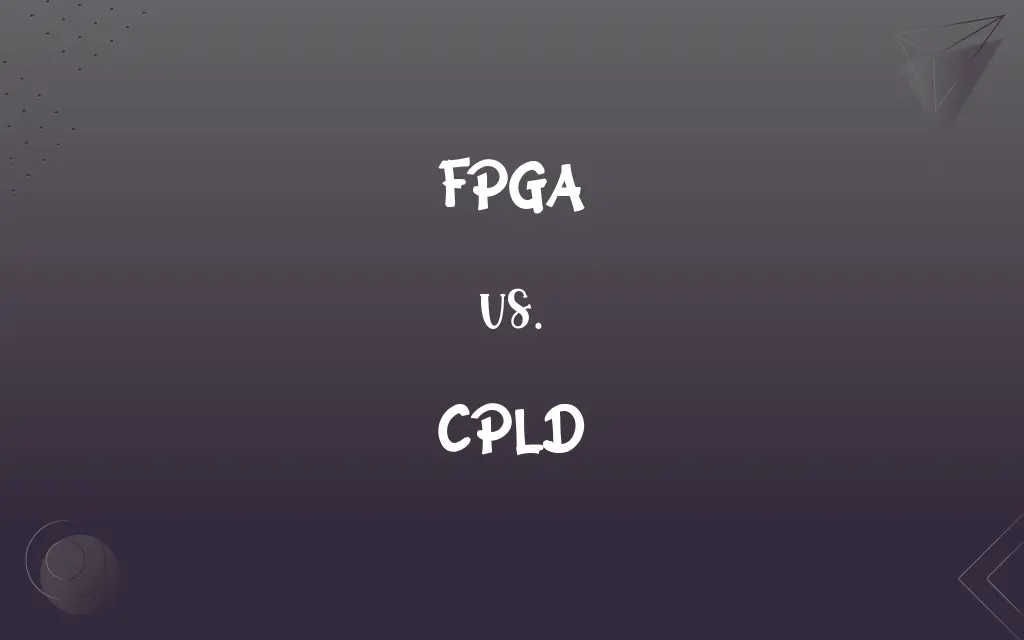FPGA vs. CPLD: What's the Difference?
Edited by Aimie Carlson || By Janet White || Published on February 1, 2024
FPGA (Field-Programmable Gate Array) is a highly flexible, complex chip for custom logic circuits. CPLD (Complex Programmable Logic Device) is simpler, for smaller-scale logic functions.

Key Differences
An FPGA, or Field-Programmable Gate Array, is a semiconductor device containing programmable logic blocks and interconnects that can be tailored to specific tasks. CPLD, or Complex Programmable Logic Device, is also a programmable device but with a simpler architecture, suited for smaller and less complex logic operations.
FPGAs are designed for more complex applications, offering a larger number of logic gates and more flexibility in programming. CPLDs, on the other hand, are more straightforward, with a fixed number of logic gates, making them faster for simpler tasks.
The reprogramming capabilities of FPGAs are more advanced, allowing for more intricate and varied configurations. CPLDs have a more limited reprogramming capacity, suitable for applications where the logic design does not require frequent changes.
In terms of power consumption and cost, FPGAs typically consume more power and are more expensive due to their complexity. CPLDs are generally more cost-effective and power-efficient, ideal for simpler, low-power applications.
FPGAs are commonly used in high-performance applications like signal processing, data centers, and aerospace, where customization and processing power are crucial. CPLDs are used in applications like device control, power management, and simple logic functions where speed and efficiency are important.
ADVERTISEMENT
Comparison Chart
Complexity
Highly complex, more logic gates
Simpler, fewer logic gates
Flexibility
Highly flexible, customizable for various tasks
Limited flexibility, fixed architecture
Power Consumption
Higher due to complexity
Lower, more power-efficient
Cost
Generally more expensive
More cost-effective
Typical Applications
Signal processing, data centers, aerospace
Device control, power management
ADVERTISEMENT
FPGA and CPLD Definitions
FPGA
Contains an array of programmable logic blocks and interconnects.
The FPGA's programmable logic blocks were configured to handle complex computations.
CPLD
Ideal for applications requiring speed and efficiency in logic functions.
For quick device control operations, the CPLD's efficiency was unmatched.
FPGA
Suited for high-performance applications requiring specific logic functions.
For our data center's needs, the FPGA's high-performance capabilities were essential.
CPLD
Offers limited reprogramming capabilities compared to FPGAs.
We chose a CPLD for its ease of programming in our stable design.
FPGA
Ideal for applications where hardware flexibility and customization are key.
In aerospace applications, the FPGA's customization is critical for specific control systems.
CPLD
More cost-effective and power-efficient than FPGAs.
The CPLD was the most cost-effective choice for our power management system.
FPGA
FPGA allows user-defined reconfiguration of its hardware architecture.
The FPGA's ability to be reprogrammed on the fly makes it ideal for adaptive technology.
CPLD
A programmable logic device for simpler, small-scale applications.
We used a CPLD for straightforward logic operations in our device.
FPGA
A highly customizable semiconductor device for complex logic circuits.
We used an FPGA for the custom signal processing in our latest project.
CPLD
Contains a fixed number of logic gates, suitable for basic tasks.
The CPLD's fixed logic gates were perfect for our simple control circuit.
FAQs
Can CPLDs be reprogrammed?
They have limited reprogramming options compared to FPGAs.
Are FPGAs reconfigurable?
Yes, they offer extensive reprogramming capabilities.
Do FPGAs consume a lot of power?
Generally, they have higher power consumption due to complexity.
What is a CPLD?
A simpler programmable logic device for smaller-scale logic functions.
Is FPGA suitable for high-performance tasks?
Yes, especially for complex and specific logic operations.
Are CPLDs more cost-effective than FPGAs?
Yes, due to their simpler architecture and fewer resources.
What is an FPGA?
A flexible and programmable semiconductor device for custom logic circuits.
Are CPLDs good for simple control circuits?
Yes, they are ideal for basic and efficient logic tasks.
What are common applications of FPGAs?
Used in signal processing, data centers, and aerospace technology.
What's the cost difference between FPGA and CPLD?
FPGAs are usually more expensive than CPLDs.
Can FPGAs be used in consumer electronics?
Yes, though they are more common in specialized applications.
What are typical uses for CPLDs?
Common in device control, power management, and simple logic circuits.
How customizable are FPGAs?
Highly customizable with programmable logic blocks and interconnects.
Do CPLDs have a fixed architecture?
Yes, they have a more fixed and less flexible structure.
Is CPLD programming user-friendly?
Generally more straightforward due to its simpler structure.
Are CPLDs suitable for home projects?
Yes, they are great for DIY projects requiring simple logic control.
Can FPGAs handle multiple tasks simultaneously?
Yes, their complexity allows for multitasking.
Is FPGA programming complex?
It can be, due to its flexibility and range of capabilities.
Which is more power-efficient: FPGA or CPLD?
CPLDs are more power-efficient due to their simpler design.
Are CPLDs faster than FPGAs?
They can be faster for simpler tasks due to their straightforward design.
About Author
Written by
Janet WhiteJanet White has been an esteemed writer and blogger for Difference Wiki. Holding a Master's degree in Science and Medical Journalism from the prestigious Boston University, she has consistently demonstrated her expertise and passion for her field. When she's not immersed in her work, Janet relishes her time exercising, delving into a good book, and cherishing moments with friends and family.
Edited by
Aimie CarlsonAimie Carlson, holding a master's degree in English literature, is a fervent English language enthusiast. She lends her writing talents to Difference Wiki, a prominent website that specializes in comparisons, offering readers insightful analyses that both captivate and inform.































































